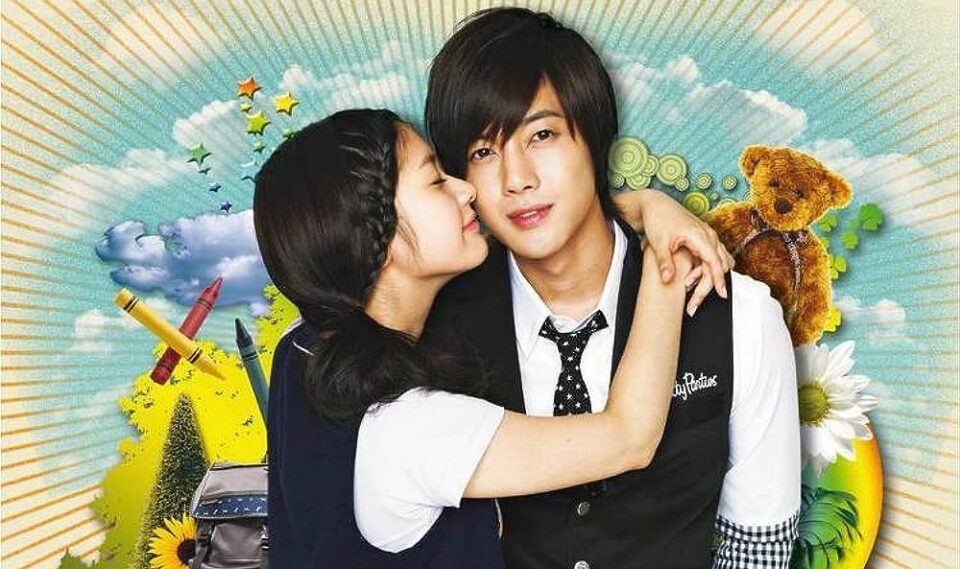K-Drama Flashback: ‘Playful Kiss’
‘Playful Kiss,’ starring Kim Hyun-joong and Jung So-min isn’t so playful per se. Between its “romance” and its “comedy,” there’s a toxic relationship and things to learn

In frame: poster for 'Playful Kiss,' featuring Baek Seung-jo (Kim Hyun-joong) and Oh, Ha-ni (Jung So-min). Photo: MBC, courtesy of IMDb
The premise of a love-hate relationship—when two distinct individuals start seemingly detesting each other—is fairly mined in teen romantic fiction. On alternate occasions, they belittle the other person up front, oblivious to a potent affinity that exists and intensifies with time, twisting hate into love—the gist of Playful Kiss in 2010 (aka Mischievous Kiss or Naughty Kiss), based on the Tada Kaoru-written Japanese manga Itazura Na Kiss. It was the third televised rendition of the manga, adhering to the Taiwanese It Started with a Kiss in 2005 and its follow-up They Kiss Again in 2007.
Fundamentally a romantic-comedy K-drama, it’s clearly a toxic love story that saw poor ratings in South Korea but became a global hit. In fact, an extended commemorative version following the series finale was made available on YouTube for this reason. Playful Kiss isn’t so playful per se. Between its “romance” and its “comedy”, there’s a girl who keeps being mocked by a guy—very unsettling, yet the chain of events therein keeps you engaged. What works best is her character evolution in the subsequent episodes, her strength, irrespective of how subservient she is, and mostly how she makes it challenging for the narcissistic, grumpy guy to give in to her emotions.
At the heart of Playful Kiss are the repercussions of exchanges between two personality traits: wrapped up in himself, popular Baek Seung-jo (Kim Hyun-joong), who constantly denigrates and neglects a harebrained, ordinary Oh Ha-ni (Jung So-min), who romanticizes him nonetheless. At variance with Seung-jo, sharp as a tack and smart as a whip, celebrated in school, Ha-ni lags academically. Tension within them arises once she writes him a love letter, much to his chagrin, and manifolds when she’s coerced into living with his family. Ha-ni endeavors to sway Seung-jo further, but winds up wary of his stern, harsh temperament and agrees to marry her classmate Bong Joon-gu (Lee Tae-sung). Seung-jo, as a result, grows restless and decides to win her back, fearing he may lose her.
Seung-jo maintains the image of the cocky, self-serving, and irritable male who dismisses a woman’s feelings and condemns her in many ways. He throws her a kiss at a practically aggressive moment, and she instantly turns against him. Still, she loves him through his numerous insults, his indifference, and his bullying of her. The ongoing growth of her nature, which I already marked up, commands notice as the story advances. She can seem odd and frail at first, but she is tenacious—one who can work her fingers to the bone. Hence, she prevails in softening Seung-jo’s heart. Ha-ni progresses in life, personifying an invaluable life lesson—with an unswerving mind and unflinching passion, anyone can brighten up—a major takeaway from the drama.
The worldwide success of the show may also be attributed to the fact that it encourages taking chances and not giving up on a relationship. It’s a reminder of how ubiquitous scenarios like this are in society, pertinent to those who are experiencing abusive relationships. Also, toxic relationships tend to be viewed as interesting narratives, despite their portrayal of the awful. The mending of such a connection that ensues in Playful Kiss may parallel how most of us let go of the pain in pursuit of a happy closure.







